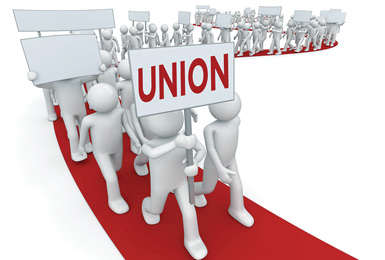Employers Beware: A New Push for Unionization
With the appointment of Craig Becker to the National Labor Relations Board, unions are likely to attempt to gain power and make labor organizing easier.
March 2011

President Obama awarded Becker an interim appointment to the NLRB in February 2010, after it became clear that the Senate would not approve him. During debates, Senator Ben Nelson (D-Neb.) said, "Mr. Becker's previous statements strongly indicate that he would take an aggressive personal agenda to the NLRB."
NLRB Significance
The NLRB is the quasi-judicial agency that administers the Wagner Act of 1935. The act created a system of industrial democracy and governs labor relations. New York Senator Robert Wagner, the law's sponsor, said secret ballot elections were the linchpin of American democracy and would work in industrial settings, too. The Wagner Act gives employees the right to vote for union representation.
Commonly called the National Labor Relations Act, the law is administered by NLRB members. Appointed by the President and confirmed by the Senate, they decide the rules governing union and management behavior and election conduct. Over the years, the NLRB has tried to balance the often-conflicting interests of unions, employers, and employees.
Craig Becker Controversy
Before his appointment to the NLRB, Becker was the associate general counsel for the Service Employees International Union (SEIU) and the AFL-CIO, the umbrella organization of U.S. unions. Before that, Becker taught at UCLA's Law School from 1989 to 1994, and has written extensively for several law reviews, particularly an important article, "Democracy in the Workplace: Union Representation Elections and Federal Labor Law," published in the 1993 Minnesota Law Review.
The article entailed that:
• Employers should have no legally cognizable interest in any representation election of their employees.
• In any representation election, employers should have no right to campaign against unions or question voter eligibility, union campaign conduct, or unit determination. "Only the employee constituency and their potential union representative should be heard," Becker wrote.
• Employees should not be permitted to choose not to have a union as their monopoly-bargaining agent. Their only choice should be which one.
• Employers should have no legally sanctioned role in union representation elections.
Why Unions Want the Law Changed
Unions want to ease organizing rules because membership has declined so sharply. In the 1950s, unions represented about 35 percent of private industry employees. Today, private sector unionization has dropped to 7.2 percent. This decline has occurred for several reasons:
• Many labor abuses of the 1930s - age, sex, and racial discrimination - are now outlawed by federal and state laws.
• The growing sophistication of human resources, including performance-based compensation systems like Gainsharing, have built employee-management bonds. The desire to earn rewards for improved productivity has replaced worker interest in unionization.
• The decline of the heavy industries in which unionization originally flourished - steel, auto, and heavy equipment - mean unionization candidates have dwindled.
• Employees are increasingly aware of globalization. They know they are no longer competing against a foundry, apparel plant, or paper mill next door, but with a business overseas. This has diminished unions' bargaining leverage.
• Faced with international competition, employers now try harder to stay union-free and maintain the flexibility to compete in the global market.
Project Announcements
LS Cable & System Expands Chesapeake, Virginia, Manufacturing Operations
12/22/2025
Anthro Energy Plans Louisville, Kentucky, Manufacturing Operations
12/22/2025
Novartis Expands Durham-Wake County North Carolina, Manufacturing Operations
12/21/2025
Momentous Expands Summit County, Utah, Operations
12/21/2025
Stryker Expands Salt Lake County, Utah, Operations
12/21/2025
Portal Space Systems Expands Bothell, Washington, Operations
12/21/2025
Most Read
-
The Workforce Bottleneck in America’s Manufacturing Revival
Q4 2025
-
Rethinking Local Governments Through Consolidation and Choice
Q3 2025
-
Lead with Facts, Land the Deal
Q3 2025
-
Investors Seek Shelter in Food-Focused Real Estate
Q3 2025
-
Tariff Shockwaves Hit the Industrial Sector
Q4 2025
-
America’s Aerospace Reboot
Q3 2025
-
The Permit Puzzle and the Path to Groundbreaking
Q3 2025